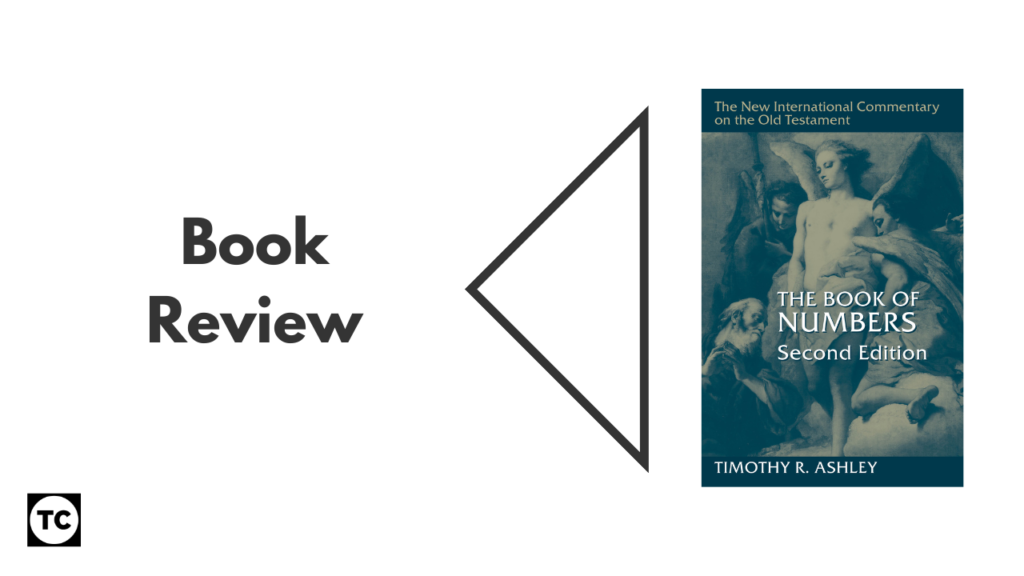
I recently shared my pile of books from the November conferences in the USA – and one of those was the commentary I’m reviewing today. It’s worth noting from the outset that my reason for reading this commentary was part professional (I’m working on a number of projects in Numbers in the next year or so, including a commentary at a level up and a level down from the NICOT, as well as a Lent devotional book) and part devotional (I like to use commentaries to dig into God’s word in my personal devotional time). I’m not reviewing this as an Old Testament Scholar, Hebrew linguist, or Numbers specialist – but as a generalist who finds commentaries fascinating, loves the Bible, and occasionally preaches.
This review is thus idiosyncratic – but I hope it will help some readers make a decision about whether or not this volume is for them. Ashley’s entry in the NICOT series has a good reputation (Ranking #4 on bestcommentaries.com) and this volume updates his work from 1993 – his preface to the second edition is a helpful overview of what’s changed, not least that publications on Numbers have proliferated in the intervening 30-odd years. If you’ve used the NICOT series before (or it’s NT counterpart), the format will be familiar – for anyone else, these are verse by verse commentaries with translation, from a generally conservative evangelical theological slant, but engaging carefully with secondary literature. You don’t need Hebrew to use them – though at points it would help.
Numbers is not a book that is traditionally exciting for study or regularly preached – but Ashley’s work confirms that it is deep and rich, and should be read more widely. Not for nothing does he comment on 7:10-88 that “This passage is one of the most repetitive and, consequently, one of the most ignored passages in the Old Testament“. Some readers may feel that way about Numbers – this commentary shows some of the depth and riches to be found in this seemingly repetitive and oft-ignored book. Ashley does some engagement with source critical issues, but as he notes (p. 160), “What is important for our purposes of commenting on a text is it’s final form, not hypothetical predecessors of it. The text we have contains all sources.” This is a commentary that deals with the text we have, and this focus is important. Even the seemingly never-ending lists and data have real theological meaning – for example, commenting on the census, Ashley writes “Here at the end of the period, the comment is made that the death sentence had been carried out; only Caleb and Joshua (and Moses) were left from the names counted in the first census. The census was written proof that God’s word had been kept” (p. 482, my emphasis). The complex relationship with Moses that Numbers represents is highlighted by Ashley: “2 Moses wrote down. This is the only place in Numbers that mentions Moses writing” (p. 558).
There were a couple of biblical-theological themes that Ashley’s work made sing for me. A key one – and part of the concern of Numbers in particular and the later Pentateuch more generally, is that of retirement and transition. In Numbers 8:25 (in Ashley’s translation) we read “from fifty years of age, one shall retire from the service of the work, he shall do no more work” – not something I remember from Sunday School, but an interesting tidbit. Leadership in general is a key focus in Numbers – whether it is “Crises of authority along the way” (comment on 11:1-12:16, with 11:1 containing the wonderful phrase, perhaps familiar to church leaders, “murmuring their misfortune”); God’s leadership as being constant and ongoing (“The hymnic participle, however, describes action as ever in progress – God is always bringing the people of God out of Egypt, out of the wilderness; it is always a present reality” p. 428); or the fact that even in the dense lists and detailed description, “it surely does give some of the first glints of messianic hope, even if only in a highly indirect form…” (p. 449).
This is a thorough and helpful commentary, which by and large manages to keep moving through the complex and dense book of Numbers. Certainly it held this readers attention – and were I to be preaching Numbers, it would be off the shelf and on the desk pretty quickly. As is ever the case with Eerdmans NICOT/NICNT volumes, this is a beautifully produced hardback that is a pleasure to use. My only negative comment (Again, as a non-specialist!) would be that the introduction was perhaps a little cursory – but, as ever, all commentaries are a balancing act. The back matter (indices of Authors/Subjects/Scripture and Other Ancient Texts) is thorough and helpful, and there are two interesting excurses on ‘Large Numbers’ and ‘The Levites in the Book of Numbers’.
Leave a Reply